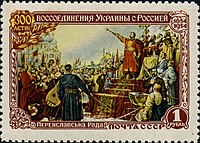This article needs additional citations for verification. (May 2024) |
| History of Ukraine |
|---|
 |


The Pereiaslav Agreement or Pereyaslav Agreement[1] (Ukrainian: Переяславська рада, romanized: Pereiaslavska Rada, lit. 'Pereiaslav Council', Russian: Переяславская рада) was an official meeting that convened for a ceremonial pledge of allegiance by Cossacks to the Russian tsar, then Alexis (r. 1645–1676), in the town of Pereiaslav in central Ukraine, in January 1654. The ceremony took place concurrently with ongoing negotiations that started on the initiative of Hetman Bohdan Khmelnytsky to address the issue of the Cossack Hetmanate with the ongoing Khmelnytsky Uprising against the Polish–Lithuanian Commonwealth and which concluded the Treaty of Pereiaslav (also known as the March Articles).[2] The treaty itself was finalized in Moscow in April 1654 (in March according to the Julian calendar).
Khmelnytsky secured the military protection of the Tsardom of Russia in exchange for allegiance to the tsar. An oath of allegiance to the Russian monarch from the leadership of the Cossack Hetmanate was taken, shortly thereafter followed by other officials, the clergy and the inhabitants of the Hetmanate swearing allegiance. The exact nature of the relationship stipulated by the agreement between the Hetmanate and Russia is a matter of scholarly controversy.[3] The council of Pereiaslav was followed by an exchange of official documents: the March Articles (from the Cossack Hetmanate) and the tsar's declaration (from Russia).
The council was attended by a delegation from Moscow headed by Vasiliy Buturlin. The event was soon thereafter followed by the adoption in Moscow of the so-called March Articles that stipulated an autonomous status of the Hetmanate within the Russian state.[1] The agreement precipitated the Russo-Polish War of 1654–1667. The definitive legal settlement was effected under the Treaty of Perpetual Peace in 1686 concluded by Russia and Poland that re-affirmed Russia's sovereignty over the lands of Zaporozhian Sich and left-bank Ukraine, as well as the city of Kiev.
- ^ a b Pereyaslav Agreement Britannica.
- ^ Magocsi, Paul Robert (2010). History of Ukraine: The Land and Its Peoples (2nd ed.). Toronto: University of Toronto. p. 227. ISBN 978-1442610217.
- ^ Cite error: The named reference
Kozaczyzna, Rzeczpospolita, Moskwawas invoked but never defined (see the help page).